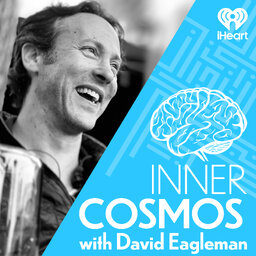Ep29 "What does it mean to know thyself?" Part 1
Did Joan of Arc turn the tide of the 100 Years War as the result of a brain disorder? Would you appreciate Taylor Swift if you only had an internal camera to watch her vocal chords? What do almost all drugs of abuse have in common? How can the tiny molecules of rabies virus control your behavior? Join Eagleman on a two-part deep dive into the fundamental question of how biological insights can shed light on the ancient question of who we are.
In 1 playlist(s)
Inner Cosmos with David Eagleman
Neuroscientist and author David Eagleman discusses how our brain interprets the world and what that …Social links
Follow podcast
Recent clips

Ep139 "What does alignment look like in a society of AIs?" with Danielle Perszyk
58:23

Ep138 "Why do our political brains mistake opinion for truth?" with Kaizen Asiedu
1:07:52

Ep137 "Do cures ever create the next crisis?" with Thomas Goetz
47:09
 Inner Cosmos with David Eagleman
Inner Cosmos with David Eagleman